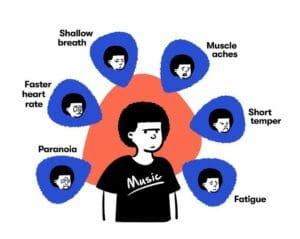
A music therapist reveals her three game-changing daily habits to handle stress

Marianne Rizkallah, Music Therapist for music licensing company PPL PRS
Marianne is Vice Chair and Trustee for the British Association of Music Therapy, Director of North London Music Therapy and Music Therapy Outreach and Enterprise Tutor for the Guildhall School of Music and Drama. She qualified as a music therapist from the Guildhall in 2013.
Since March 2020, a lot has changed for many across the UK. For those of us who were making it through life well enough, it now seems common to know of someone experiencing symptoms of anxiety or feel a little on edge yourself. As many of us return to the office for the first time or embark on the next chapter in our lives, realising the symptoms of our stress and working out ways to overcome them is essential.
Signs of anxiety and stress in the workplace
Firstly, let’s establish the signs of anxiety so we can understand our bodies and mind before implementing ways to aid these symptoms. We may experience physical feelings such as a quickening heart rate, shallow breaths, fatigue and muscle aches. In a workplace context, anxiety can manifest as feeling irritated by our colleagues or paranoia, whereby we presume the worst when a senior manager makes a comment, for example. Our minds can be masters at playing tricks on our bodies, causing symptoms to feel very real and overwhelming. What it means though, is that if we can harness the power of music and other habits to calm our anxious minds then our physical symptoms should subside too.

The physical symptoms of anxiety – PPL PRS
As a music therapist, I dedicate my career to supporting others and their symptoms. That said, it’s important to practise what I preach so here are my three favourite daily habits to ease negative feelings.
- Listen to your favourite music
In a recent PPL PRS survey*, when asked whether different types of music affect their mood in different ways (i.e. some lift their spirits while others leave them feeling mellow), almost two-thirds of Brits answered ‘yes definitely’ while 31% said ‘yes sometimes’.

I recommend tailoring your music choice to your need at the time:
- Play faster music to boost energy
Music genres with a slightly higher BPM (beats per minute) than your heart rate will encourage your heart to keep pace, pumping more oxygen around your body and have you firing on all cylinders. Therefore, music can enhance sporting performance — whether you’re in the gym or gearing up for a game.
You may wish to play tracks with a faster tempo at work to turbo-charge you through your to-do list; on admin-heavy or repetitive tasks, for example. Indeed, PPL PRS further found that pop music — a generally upbeat style of music — is the most popular genre to power productivity at work (43%) while over a quarter (26%) of UK workers prefer rock
- Or try music without lyrics to aid concentration
Having a musical “sound bath” without the distraction of words can give your mind the space to tune into your immediate surroundings. This is ideal when everything feels slightly overwhelming or you’re working to a tight deadline.
Ultimately, experiment with slow and speedy tracks to find the genre that’s best for you.
- Get out into nature
Studies are still discovering exactly how being around wildlife helps our mental health. But in my experience as a music therapist, many people point to the calming feeling of being in nature and at one with the rhythms of the earth to help organise their thoughts.

Being outdoors engages the senses. Taking a moment to appreciate the season’s sights – from red and golden autumn leaves to bright summer sunshine – can evoke gratitude. Ambient sounds, like birdsong, may also relax you. If you run on a busy schedule, it’s natural to worry that you don’t have enough time but never underestimate the power of fresh air and a change of scene to re-charge you. Stretching your legs supercharges your physical health, too.
You could turn your stroll into a social occasion by inviting your partner, a friend or family member. This may either take your mind of any worries or present an outlet to share how you feel with another person. Suggest a ‘walking meeting’ with a colleague if you have returned to the office or dial into a video call while outdoors; a different environment may untap new creative ideas.
- Write down your thoughts
This could be something more intentional, like journaling, or it could be free association scribbling onto paper until everything is out of your head. Being able to see your thoughts in front of you gives you a space to reflect on what was previously locked up in your mind. Having that new perspective can help you feel less overwhelmed.

*A survey of 2,101 UK respondents by Perspectus Global in September 2021.


